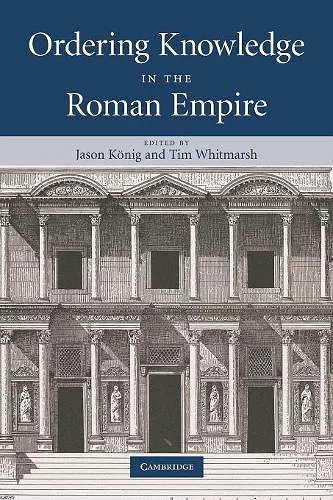Ordering Knowledge in the Roman Empire
Tim Whitmarsh editor Jason König editor
Format:Paperback
Publisher:Cambridge University Press
Published:30th Jun '11
Currently unavailable, and unfortunately no date known when it will be back
This paperback is available in another edition too:
- Hardback£94.00(9780521859691)

This fascinating collection considers the dialogue between technical literature and imperial society in the Roman Empire.
The Roman Empire depended not just upon political, military or economic control, but also upon information management. Engaging with modern cultural theorists, this volume considers how the huge body of Roman technical literature debates relationships between the emperor and his subjects, and between imperial centre and periphery.The Romans commanded the largest and most complex empire the world had ever seen, or would see until modern times. The challenges, however, were not just political, economic and military: Rome was also the hub of a vast information network, drawing in worldwide expertise and refashioning it for its own purposes. This fascinating collection of essays considers the dialogue between technical literature and imperial society, drawing on, developing and critiquing a range of modern cultural theories (including those of Michel Foucault and Edward Said). How was knowledge shaped into textual forms, and how did those forms encode relationships between emperor and subjects, theory and practice, Roman and Greek, centre and periphery? Ordering Knowledge in the Roman Empire will be required reading for those concerned with the intellectual and cultural history of the Roman Empire, and its lasting legacy in the medieval world and beyond.
Review of the hardback: 'König and Whitmarsh's collection of eleven essays, whose origins can be traced to a 2001 conference held at St John's College, Cambridge, is a welcome edition for what might be called the emerging field of the history of information science … this volume comes highly recommended on account of the wide range of authors it considers, the variety of analytical methods it employs and its nuanced understanding of the relationship between compilations of knowledge and their contexts.' Bryn Mawr Classical Review
ISBN: 9780521296939
Dimensions: 229mm x 152mm x 17mm
Weight: 430g
320 pages